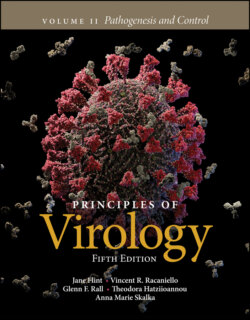Читать книгу Principles of Virology, Volume 2 - Jane Flint, S. Jane Flint - Страница 20
BOX 1.1 DISCUSSION Why viruses may not fulfill Koch’s postulates
ОглавлениеAlthough Koch’s postulates provided a framework to identify a pathogen as an agent of a particular disease unambiguously, not all postulates can be applied to some infectious agents of disease. Koch himself became aware of the limitations of his postulates upon discovery that the bacterium Vibrio cholerae, which causes cholera, could be isolated from both sick and healthy individuals . In fact, it has been argued that the rigid application of these criteria to viral agents may have impeded early progress in the field of virology.
Application of Koch’s postulates to viruses can be problematic for several reasons . For example, the first postulate, which states that the microorganism must be “regularly associated” with the disease, does not hold true for many animal reservoirs, such as bats, in which the virus actively reproduces but causes no disease. Similarly, arthropod vectors, such as mosquitos, support reproduction of a variety of hemorrhagic viruses but do not die as a result. Moreover, the second postulate states that the microorganism must be grown in culture. However, some viruses, including papilloma-viruses that cause warts and cervical cancer, could be propagated in culture only recently, requiring complex conditions that must mimic the tissue complexity found in the infected host. Finally, recent studies addressing polymicrobial infections (that is, infections with more than one pathogen) have shown that, for some diseases, two or more organisms must work in synergy to cause a disease.
Highly sensitive molecular technologies, including quantitative polymerase chain reaction and DNA sequencing, have triggered a revision of Koch’s postulates for the modern era. Left panel courtesy of Granger Historical Picture Archive, image no. 0008494.
Assiduously applying the postulates has been particularly problematic for identifying viruses that cause human tumors . As noted in a review, Koch’s postulates “are a brilliant example of precision in scientific thinking, but they hold little practical value for 21st century tumor virology, as they cannot prove nor disprove most candidate tumor viruses to cause cancers.” Consequently, the postulates are a guide, not an invariant set of requirements to fulfill.
More recently, detection methods based on nucleic acid sequence have rendered Koch’s original postulates even less relevant. Such approaches are sufficiently sensitive to detect the presence of small quantities of viral nucleic acid in an apparently healthy individual. As such, a revised set of Koch’s postulates that takes into consideration new technical capabilities has been proposed (Volume I, Box 1.4).
Fredricks DN, Relman DA. 1996. Sequence-based identification of microbial pathogens: a reconsideration of Koch’s postulates. Clin Microbiol Rev 9:18– 33.
Moore PS, Chang Y. 2014. The conundrum of causality in tumor virology: the cases of KSHV and MCV. Semin Cancer Biol 26:4–12.
